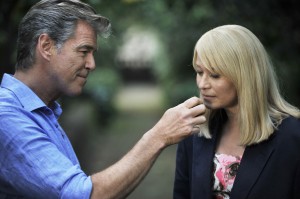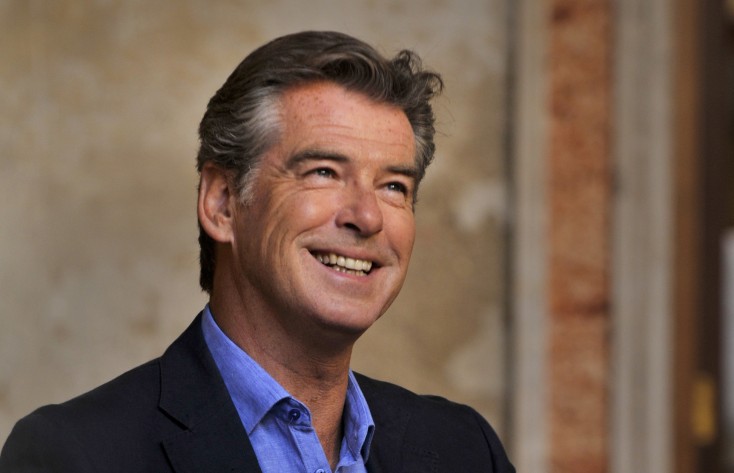
Pierce Brosnan as Philip and Trine Dyrholm as Ida in “Love Is All You Need.” ©Sony Pictures Classics. CR: Doane Gregory.
By ANGELA DAWSON
Front Row Features
HOLLYWOOD—It’s hard to believe that former Bond-man Pierce Brosnan is turning 60. While his scruffy beard and salt-and-pepper hair may signal that pending milestone, the square-jawed Irish actor remains leading man handsome.
He calls on a Friday afternoon from Los Angeles where he is promoting his newest film, the Susanne Bier-directed romantic dramedy “Love is All You Need.” Yep, like the Beatles song. This film isn’t about the Fab Four, though, but about Philip, a workaholic British widower living in Denmark who finds amour in Italy, while taking a rare break from work to attend his son’s nuptials. The object of his affection just happens to be the mother-of-the bride (Danish actress Trine Dyrholm), who is physically on the mend after a bout with breast cancer but emotionally dealing with a philandering husband and self-esteem issues.
The story rings close to home for Brosnan, whose first wife, Australian actress Cassandra Harris, succumbed to ovarian cancer in 1991. Having lost a wife to the disease, the project meant more to Brosnan than just another acting gig. He also didn’t want to let Bier down.
As he approaches his seventh decade, the versatile handsome actor is introspective about his life and career. He is looking forward to seeing his children marry and becoming a grandparent someday. Having put the James Bond spy character behind him, Brosnan is planning to play another secret agent in an upcoming film he also is producing. He will play Devereaux, a spy dealing with his past. The action drama is based on the novel “There are No Spies” by Bill Granger.
Q: This movie is very moving, especially for those who have a direct connection with cancer.
Brosnan: Yes, It’s a hard road at times. No one escapes the suffering of harsher days. I’m a man who lost his wife to ovarian cancer so I could identify with the character, Philip, in his mourning and grief, and being a father and being a single parent. It had deep resonance in my life. Those are certainly some of the reasons I said yes to the project. More importantly, it did it because of Susanne Bier’s work and the director she is, the woman she is as a filmmaker. It was very captivating. My involvement began as a simple request from my agent, who said that she was interested (in casting me). I read the piece, and it just touched and moved me. I saw that it could have meaning out there for the people who have endured such stories.
Q: Was there any particularly difficult scene to shoot either emotionally or physically?
Brosnan: The most challenging one was our first scene together—Trine and I—where I talk about the lemons and the lemon groves, just because of the dialogue and the effusive quality and nature of this, talking about lemons and oranges. I found it was tricky. But the rest was relatively easy because when you work with great actors, they make you real. They surrender to what they’re doing and they make you more real. These actors I worked with—this company of actors—were all so splendid and so nuanced and rich in preparation and rich in inventiveness that I just had to sit back and keep it as simple as possible.
Q: Was the ending always as it is in the final cut? Did the script change at all?
Brosnan: To the best of my knowledge, there were a few different endings, but the one we have is so indelible in my mind. It certainly is a tricky scene. You don’t want it to be sentimental but at the same time you want to have sincerity and honesty of playing and not just being maudlin. It was a tricky scene because we were losing the light and there were the expected technicalities of the day.
Q: You got a chance to film in Italy. And you have other films you’ve worked on or about to work on. Do you bring your wife (Keely Smith) and kids (Dylan, 16 and Paris, 12) with you when you’re on location?
Brosnan: Well, this particular film the boys were at school so it wasn’t possible. By the time they were out of school, I almost was finished with the film. So they went back to Hawaii where we have a house. They didn’t join me. That’s a hardship in the line of work that I do. But the next (film I did) was in Paris and we got to spend the summer in Paris together. That’s a film I made with Emma Thompson called “Love Punch,” which is coming out later in the year. So it depends on the nature of the beast. The next one I have to do is (on location) in Belgrade, Serbia. I don’t think that they’ll be joining me because they’ll be at school.
Q: When I first heard the title of this film, I thought it was going to have something to do with the Beatles. What does the title mean to you? Is love all you need?
Brosnan: The essential thing in life is love. From love springs … it’s the platform for how you live your life—love and only love and the generosity of that love and how you cultivate it yourself on a daily basis—within your work, within your marriage, within your friendships. The title changed, though. The script originally was called “The Bald-headed Hairdresser,” which is funny, and a completely different movie and yet the essence of it is exactly what you see in the film now. “Love is All You Need” is an unabashedly romantic title and I definitely think it’s the backbone of humanity.
Q: Your character arrives in Italy for his son’s wedding. Have you seen any of your kids walk down the aisle?
Brosnan: Not yet. I’ve not experienced that.
Q: Is that a milestone you look forward to?
Brosnan: I do. I think about it. I think about my time of being a father and husband. Certainly, as I approach the age of 60, I look at my sons and I hope and pray that I’ll get to see grandchildren and see them meet good partners in life. I have three sons and two stepchildren, grownups now, from another time. I do hope for such occasions in life.
Q: Do you think you’ll be an easygoing father in law or will you strike fear into your daughters-in-law?
Brosnan: No. That is not my way. I will be a kind, understanding father-in-law.
Q: At the beginning of the film, Philip’s staff throws him a surprise party. How do you feel about surprise parties?
Brosnan: I’ve had surprise parties in my day, and I’ve enjoyed them. Yes, I don’t have problems with surprise parties.
Q: How do you feel about turning 60 (on May 16)?
Brosnan: It’s certainly a time to reflect and, above all else, it’s a time of gratitude. I’ve created a body of work in films that perhaps some continuity to my own life and to the time that I have. (I think about) having created a family and I have a great sense of humble gratitude and awareness of precious time—past, present and future. So it’s a celebration.
Q: May I just ask you one Bond question?
Brosnan: (pauses) Um-hum. Go ahead.
Q: Did you watch the James Bond tribute at the Oscars and if you did, what did you think of it?
Brosnan: I didn’t see it. I was working. I couldn’t see it but I heard it was wonderful. And I participated in one of the documentaries for the Bond movies. It was a part of my life and now it’s another man’s job and he does greatly.
Q: OK. Back to the film. You and Trine have a marvelous scene where you dance. Are you a good dancer in real life?
Brosnan: I’m a very good dancer. And I’m a very good singer. (He laughs.) I used to do a lot of dance workshops. I trained as an actor so dancing is very much a part of an actor’s training.
Q: Can you tell me more about this film you did with Emma Thompson?
Brosnan: It’s a suburban heist movie. Then there was another one I did with Toni Collette based on a Nick Hornby novel, called “A Long Way Down,” which is about four people who decide to commit suicide on the same night. Those are in the can and coming out later this year. And then I’m about to go off with my own company and make a movie called “November Man,” which is a spy genre piece.
Q: Is that through your production company Irish DreamTime?
Brosnan: Yes. I’m producing it.




